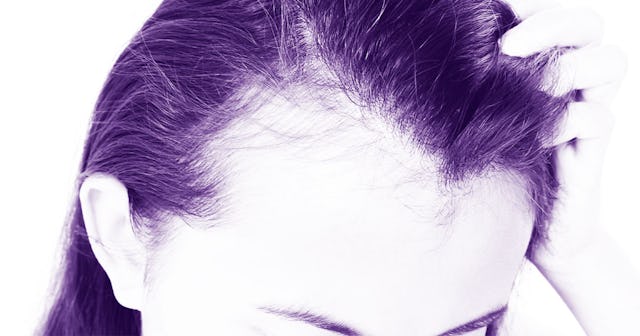I Had No Idea How Common Hair Loss In Your 40s Is -- Until It Happened To Me

It was just after my 40th birthday when I noticed my hair looked different, especially around my hairline. I’d been putting it in a ponytail my whole life, but when I’d wrap my elastic around my handful of hair, it felt smaller. I also could tell while styling my hair that it was more fragile and wispy than before.
Of course, I started obsessing — parting my hair in different places, looking for bald patches. I wondered if it was my diet and racked my brain to see if I’d started doing something different with my locks. But I was doing the same things I’d always done.
Then, I dug out pictures of me in my 20s and 30s and held them next to my noggin and stared in the mirror. Yup, something was different. Where my hair used to be poofier and I could feel the weight of my messy bun on top of my head, I now had fewer strands to work with. And let me be honest, thinning hair feels a little devastating.
I talked to my doctor about it and she told me it was perfectly normal for your hair to start thinning out in your 40s, and she didn’t think I had a need to be concerned. It looked like I had “normal perimenopausal hair.” Whatever the hell that is.
I talked to a few friends who were my age and asked them if they’d noticed a difference in their hair. It was an overwhelming “YES!” across the board. Not only had my friends not been talking about losing their hair because they felt it was something that was happening to them, not a universal side effect of growing older, they’d been to their doctor to discuss it too.
Some were looking into hair replacement options, and taking certain vitamins in hopes of getting their locks back the way they were.
One of my girlfriends, who has long beautiful hair, said she noticed a lot more hair running down the drain when she showered and was pulling a lot of it out of her brush.
The thing was, as I looked at my friends (a few of them I’d known since high school), their hair looked exactly the same. But knowing it was happening to us all did bring some comfort.
Scary Mommy spoke with Dr. Anna Cabeca ,who is a triple board-certified, prominent Emory University-trained physician and author of The Hormone Fix. She said that, as you age, your natural levels of hormones start to change. Around this time, you may notice that your hair is beginning to thin. Yet another thing our hormones totally screw up for us. Great.
There is hope, however. “You can reverse these hormone imbalances and start re-growing your hair again,” Cabeca reports.
Okay, sign me up. I’ll literally do all the things I’m told in hopes of saving my hair (and my mood swings).
First, Cabeca says it’s imperative to eat healthfully to avoid the fallout. Hair loss can also be linked to a lack of nutrients in the diet, including protein, zinc, and iron. She advises to “eat foods like red meat for iron and protein, shellfish like oysters for zinc, and lots of green veggies for iron.”
Also, pumping up the omega-3s can help because a lack of omega-3 fatty acids, needed for healthy cell membranes, can contribute to hair loss. Fish oils are the most common dietary sources of omega-3s, but vegetarians can supplement with flaxseed oil to prevent hair from becoming dry and brittle.
You can also try and eat more fish high in omega-3s, too, such as salmon.
Another tip, according to Cabeca, is to eat two Brazil nuts nightly. “This will provide approximately 200 micrograms of selenium into your diet, which aids in strong hair,” she says.
If you are a sushi lover, you are in luck. Sushi and seaweed contain natural iodine, which promotes healthy hair. So don’t be shy and order that extra roll or snack on some of those seaweed squares.
“Go herbal for good hair days. Try supplementing with herbs that support hormone balance because they contain plant-based estrogens,” says Cabeca. These include black cohosh, ashwaganda, and chaste tree extract.
A cup or two of green tea a day may also put hair loss on the slow track, reports Cabeca. “Green tea contains catechins, which inhibit an enzyme involved in converting testosterone to its follicle-killing form, dihydrotestosterone or DHT.” Green tea extract is also an ingredient in some hair care products because it can help strengthen damaged hair.
If your hair loss worsens, call your family doctor, who may refer you to a dermatologist. “He or she can give you a thorough check-up and give you a plan to manage the condition,” recommends Cabeca.
Case in point: some amount of hair loss is going to be expected as you age. It seems a lot of women notice this change in their 40s. While it is normal, it doesn’t mean there aren’t options out there if it bothers you. It can be as simple as taking a few supplements.
Yes, another thing we have to think about, but it’s empowering to know we have options and can reverse some of the shedding.